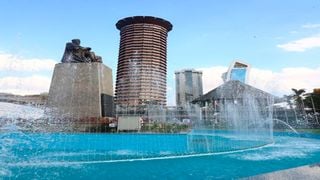
The Kenyatta International Conference Centre in Nairobi.
| File | Nation Media GroupOur Columnists
Premium
Parastatal sale is backdoor looting
To say Kenyatta International Conference Centre is Kenya’s iconic building is not doing it justice; it is much more than that. It is our collective history, heritage and memory.
How many of us have photos of or bell-bottom-clad family members proudly showing KICC in the picture while imagining holding its roof? A generation of Kenyans identify Nairobi with it.
When coming from rural Kenya, it was KICC that gave you the bearings and marked your entry to this green and pleasant capital city.
Who, now, in their madness thinks it is even conceivable to auction one of the most unifying symbols of Kenya? You cannot put a price tag on KICC, given its sentimental value to the country. Pure greed!
If one wants to discern greed in Kenya, they don’t need to look further than Kenya Power. A company with the monopoly to provide electricity to 50 million consumers cannot just be broke but through graft.
I had the misfortune of starting my working life at the tail-end of the Moi era, bright-eyed and bushy-tailed, ready to serve with corruption-free head. Up to that point, my generation had been sheltered from corruption, which, unbeknownst to us, was slowly tightening its noose on Kenya.
President Daniel arap Moi’s regime was also synonymous with nepotism, tribalism and impunity, characters that are on the return as the Kenya Kwanza coalition adopts governance style from the late Moi’s political playbook.
Privatisation or sale of key parastatals is not new. It occurred with impunity under Moi’s watch. Gutting down profitable institutions in the name of privatisation was not aimed at benefiting the country but select greedy politicians and tribes.
The trend of privatising profit-making parastatals does not only raise eyebrows due to its timing but also begs the question whether it’s an altruistic way to boost the economy. It’s greed manifesting with a few people in government aiming to buy the parastatals at throwaway prices or loot the properties associated with them. A good example is the newly bought high-end government vehicles that ended up deliberately immobilised and left crouching on stones for a while before being auctioned cheaply to corrupt officials.
The reorganisation of parastatals is nothing new. It is a scheme that has been used by incumbent governments to benefit their cronies. Asking for staff to reapply for their jobs at newly refurbished government agencies, for instance, is just a way to deselect staff already employed to create employment for select communities.
The NHIF has just been revamped and, already, old staff are staring at redundancy rather than being transferred horizontally to the new body, Shif. Experienced staff are being made to make way for amateurs benefiting from nepotism. If you don’t trust me on tribalism and nepotism being the single factor considered by the government on employment, please read the recent NCIC report that shows only a handful of ethnic communities hold jobs in government ministries and agencies.
Past forced redundancies in government parastatals were painful to workers. They came thick and fast and were as brutal as brutal can be. Many workers who were sent home went before their time with little severance pay that could only last them from dawn to dusk. With the little notice given, they had no time to get another job. I know of many families who fell afoul of the scheme with devastating effects.
Leaders must strive to keep people employed so that they can contribute to the economy productively. Work, especially on pensionable and permanent terms, is a social care programme that governments need to encourage. Many organisations that were privatised offered good quality life through better pay, health insurance, pension and job security. The latter has become a poisoned chalice in capitalistic societies, where corporate greed is rampant and only the top-tier management have the licence to prosper over the blood, sweat and tears of temporary workers.
Moi’s playbook had a chapter on impunity. Essentially, respect for the rule of law was unheard of. We are seeing a drip-drip effect of erosion of the rule of law in the way the government disregards court orders or attempts to skew judicial decisions in its favour. The 2010 Constitution was meant to rid the country of all the ills in the playbook used by one-party state of yesteryears, where impunity reigned.
A democratic state is open to public discussion on public properties and heritage. The current privatisation scheme (in a bid to appease the World Bank and IMF) is clearly not for the benefit of Kenya but to pave the way for even more loans, for embezzling by the elites. If all the loans given to Kenya were put to proper use, we would not be as broke and thus forced to use broken public systems. The Bretton Woods institutions will not agree to be scammed but why they keep funding thieving African governments leaves a lot to be desired.
The proposed privatisation is euphemism for looting the country through the back door. If it ain’t broke, why fix it?
Ms Guyo is a legal researcher. [email protected]. @kdiguyo





